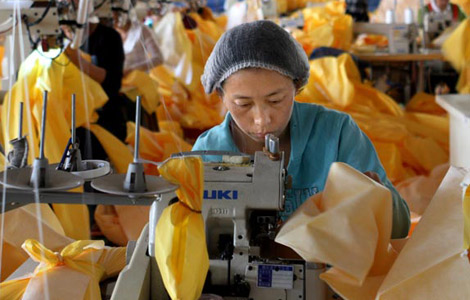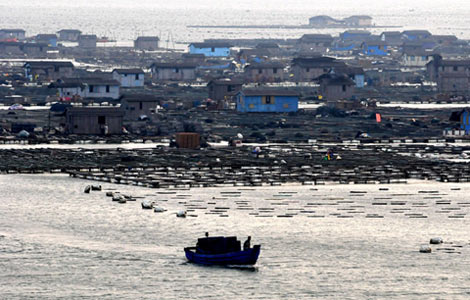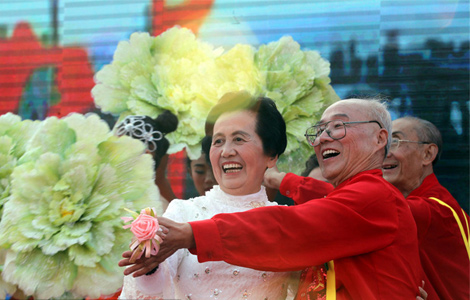Seeking the light
Updated: 2014-10-29 07:12
By Liu Zhihua(China Daily)
|
||||||||
As Yan Lianke wins this year's Kafka prize for his 'artistically exceptional' writings, his fans from China's literary world tell Liu Zhihua why the author is deserving of the recognition.
Yan Lianke received the Franz Kafka Prize on Oct 22 in Prague, becoming the first Chinese author to win the award, established in 2001 in honor of one of the 20th century's most influential writers. The prize recognizes anyone "whose work addresses readers regardless of their origin, nationality and culture".
So far its 14 laureates include American novelist Philip Roth, Japanese author Haruki Murakami and Israeli author Amos Oz. Past winners, including Elfriede Jelinek in 2004 and Harold Pinter in 2005, went on to win the Nobel Prize in literature as well.
Ahmed Alsaeed, a translator and copyright agent from Egypt, says he wasn't surprised Yan won the award.
"His works are fearless, no matter whether in innovation of structure, content or wording," Alsaeed says.
Born in 1958 in Songxian, Henan province, Yan enlisted in the army in 1978. He began to publish his writings in the early 1980s, and the subjects of his short stories and books were mostly inspired by military and rural life in China since the 1960s.
Yan is best known for his highly satirical style of writing and his own interpretation of reality.
Yan has published more than 20 novels and collections of short stories, which have been translated into dozens of foreign languages.
In 2013, Yan was shortlisted for the Man Booker Prize.
He won China's top literary award, the Lao She Literature Prize, in 2004 for his novel Shou Huo (Lenin's Kisses), in which residents of a fictional 1990s village plan to buy Vladimir Lenin's embalmed body from Russia to build a mausoleum in their village as a tourist draw.
The book was written in a peasant dialect of Henan province, and "shou huo" literally means "to receive life".
According to Gao Xing, a literary critic, Yan deserves the prize for both artistic and ideological achievements through his writings.
"Yan has distinguished himself from others who write on China's army or rural life, because he has rich experiences, a sharp observation, fertile imagination and a skillful writing style," Gao says.
"He has great writing technique but that becomes secondary to the depth of his thoughts.
"His works are deeply rooted in China's realities, and he is one of the few writers who has the courage to write honestly about the absurdities of reality."
The Kafka prize panel announced in May that Yan, a first-time nominee, had won from among eight other globally renowned authors because of his "artistically exceptional" works.
During his award acceptance speech at a town hall in Prague, the Beijing-based author spoke of his childhood in the early 1960s, when widespread famine killed millions of Chinese, and how the memories influenced his writing.
He said as a little boy, he was exposed to "darkness of life", when his mother pointed to a wall and told him that a special kind of edible clay would save people if they were to starve to death, and that there was another that would kill people if eaten, according to Qq.com, a Chinese portal website that had a reporter at the event.
"In a writer's eyes, the worsening reality be it in daily problems involving food and drinks, shelter and traffic, or the newly emerged plight of getting quality medical services, education or old age life makes people anxious and restless, fearful and excited," the website quoted Yan as telling his audience at the ceremony.
But he also emphasized his determination to seek out the light.
"The most powerful and frightening darkness comes from people's accommodation and surrender to the darkness, forgetting the light, hence the greatness of literature demonstrates, because only literature can find the weakest and tiniest light, beauty, warmness and honest love in the dark," Yan said.
At a news conference related to the award, Yan told media that a good writer could often be controversial.
But he hoped that attention to him was because of his literary achievements and not because he is labeled "controversial", according to Chen Feng, deputy editor-in-chief of Shanghai 99 Readers' Culture Co, a publishing house that helps promote Yan's works overseas.
Chen has known Yan for several years and accompanied him to Prague. Chen told China Daily that his company will publish an autobiography of Yan, telling how the son of a peasant family became a professional writer.
The book, titled Leave From Tianhu Village to Look For Li Bai, will be on the market in late November.
China Daily couldn't reach Yan for comment as he was traveling.
Contact the writer at liuzhihua@chinadaily.com.cn
(China Daily 10/29/2014 page20)

 China factory well suited to help in Ebola fight
China factory well suited to help in Ebola fight
 'World Heritage in China' photo exhibition held in Belgrade
'World Heritage in China' photo exhibition held in Belgrade
 6th World Traditional Wushu Championships kicks off in Anhui
6th World Traditional Wushu Championships kicks off in Anhui
 A 'floating city' in East China
A 'floating city' in East China
 Couples mark golden wedding anniversary in Jiangsu
Couples mark golden wedding anniversary in Jiangsu
 Giant chocolate King-Kong ready to storm the stage
Giant chocolate King-Kong ready to storm the stage
 ZTE to be NY Knicks' smartphone sponsor
ZTE to be NY Knicks' smartphone sponsor
 China's economy in 'transition': expert
China's economy in 'transition': expert
Most Viewed
Editor's Picks

|

|

|

|

|

|
Today's Top News
Two Chinese universities listed in top-100 ranking
Ontario seeks business in China
China factory well suited to help in Ebola fight
Suning sets the date: 11.11 debut for US store
Chinese rail firms in mix for California
ZTE to be NY Knicks' smartphone sponsor
Man guilty of murder in attack on Chinese students
Canadian PM cancels trip to Beijing for APEC meeting
US Weekly

|

|







